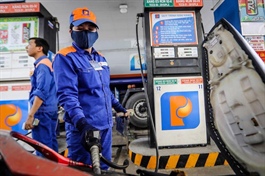Fake medicines on the rise
Fake medicines on the rise
More fraudsters are using online platforms, social networks and messaging services to sell and distribute fake medicines, according to Le Van Truyen, Chairman of the Advisory Council for the Registration of Circulation of Drugs and Medical Ingredients.

The chairman was speaking at a seminar on fake medicines and functional foods yesterday.
According to Truyen fake medicines make up roughly US$80 billion of the global pharmaceutical market. The medicines are manufactured predominantly in China, India and Singapore, and penetrate target markets mostly through Yemen, Iran and Hong Kong.
In Viet Nam, fake medicines are running rampant as fraudsters have become more well-organised. For instance, a pharmaceutical factory, recently, has been caught producing millions of fake Neo-codion pills while in the process of being GMP-certified.
"That was such a suicidal decision of the factory manager because he had invested $20 million in the factory, which was about to get GMP-certified," he said.
He urged pharmaceutical firms to use high technologies to shield their products from counterfeiting. Such technologies include blockchain, internet of things, radio frequency identification and image processing.
Nguyen Duc Le, Deputy Director of Market Surveillance, asserted that in the past fake products came largely from domestic craft villages but now they originate from abroad.
Since early 2022, the number of detected cases has been on the rise, with 60 found for products of substandard quality, 357 for products with forged labels, 34 for products with forged certificates, 162 for products violating intellectual property rights and 982 for products of unknown origin.
He attributed the rise of fake medicines to the practice of medicine-hoarding among Vietnamese people. It was the case because hoarding leads to supply-demand imbalances, allowing substandard medicines to move in to fill the supply gap.
The authorities can easily detect fake medicines once they test their samples. Unfortunately, the costs of quality tests are so high that it is impossible to do so across the board. That means they have to leave many medicines untested, resulting in mounting fake medicines.
Nguyen Manh Hung, Chairman of the Vietnam Association for Protection of Consumer Rights, estimated that about 30,000 functional foods were permitted to be sold in Viet Nam, roughly 20 per cent of which were produced overseas and over 70 per cent domestically.
As functional foods were lucrative, fraudsters had been flocking to the industry to reap profits. Notably, 20 tonnes of fake functional foods were discovered and seized in Ha Noi several years ago, revealing the true size of the illegal market.
The chairman called on the authorities to step up inspection to bust more counterfeiting facilities and, at the same time, discourage consumers from buying functional foods of unknown origin.
Tran Duc Dong, Deputy Chief of Office of the National Steering Committee on Anti-Smuggling, Trade Fraud and Counterfeiting, revealed that 4,094 illegal cases were detected in 2021, of which 1,027 were due to smuggling, 2,867 in trade fraud and 200 counterfeit cases.
According to a representative from Ngoc Linh Ginseng Pharmaceutical Group Vietnam LTD, Ngoc Linh ginseng is so precious that they have made a name for themselves as a "great treasure". However, 90 per cent of the ginseng in the market is fake, causing serious reputational damage to genuine products.




























